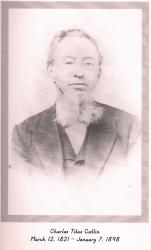- |
User Links
C. T. Catlin

| Short Name: | C. T. Catlin |
| Full Name: | Catlin, C. T. |
Charles Titus Catlin was born on March 12, 1821 near Fort Ann, New York. He was the oldest of five children of Leonard and Lucinda Catlin. His family moved from the Fort Ann, New York area to West Troy, New York between 1830 and 1835. According to family oral tradition Leonard Catlin operated a canal boat business and Charles worked as a canal boat pilot. While Charles traveled the Erie Canal, he wrote many poems with deeply religious themes. His earliest extant poem dates to 1838. His poetry infers that he was well educated and according to family oral tradition could read Greek as easily as we read English.
On March 27, 1842, Charles Titus Catlin married Jane A. Morrison and had three children with her by 1848. By early 1847 Charles started to lament the Erie Canal life that takes him away from his “…children dear” and his“…fond and faithful wife.” On May 1, 1847 Charles sold his 80 - ton scow the “Charles T. Catlin”. Based on his poetry he continued to pilot on the Erie Canal but by 1850 he was working as a tinsmith in his father’s and brother’s tinsmithing shop, “L. Catlin and Son.” He continued to write poetry and has some of his works published in the local newspaper, The West Troy Advocate. By 1857 Charles moved with his family from West Troy to Troy, New York. Charles worked as a tinsmith until 1859 when he started working for his father as a bookkeeper. From 1860 to 1868 his occupation is listed as bookkeeper.
In 1869, he was listed as the principal of the William Rich School in Troy, New York. The William Rich School was an all African-American school. When the school was closed in the spring of 1873, Charles later in the year was ordained at the 5th Street Baptist Church in Troy on December 13, 1873. Based on his extant sermons, Charles worked as a circuit pastor for two churches in Rennsalear County from 1876 to 1879. On December 7, 1879 his wife of 37 years died and he moved to East Poestenkill, New York in 1880, where he was the pastor of the East Poestenkill Baptist Church.
On April 8, 1883, Charles married Cynthia A. Wager, a widowed woman with one surviving child. The couple had a 28 year age difference between them. Together the couple had three children, one of which lived to adulthood. Charles Titus Catlin continued to pastor at the East Poestenkill Baptist church until he became ill before his death on January 7, 1898. He was buried in the Oakwood Cemetery in Troy next to his first wife. As of the early 21st Century he has over 366 descendants by his youngest surviving son from his second marriage.
Notes on the song “I Long to be There” and “Deliverance will Come”:
Based on the poetry of Charles Titus Catlin, Charles appears to have been caught up in the anticipation of the expected Second Advent of Christ in the early 1840’s. He writes in 1843 the poem, “An Admonition to Inconsiderate Judges of the Miller Theory”. In this poem he writes, ‘If the cause is of God, Tis useless on Miller, to Hamper.”
In spite of the “Great Disappointment” the poem “I Long to be There” passionately anticipates a better world to come. Charles work, originally written as a 10 stanza poem, is found as part of his paste book collection of poetry dating from the late 1840’s to the mid 1850’s. Most of the poems written in the book were published under his name in the West Troy Advocate.
“Deliverance Will Come” has long been considered by the Catlin Family to have been an original work by Charles Titus Catlin. The poem is found among his collection of paste book poetry. In Charles T. Catlin’s two poetry books he appears to be very careful to only attribute his work with his initials C. T. C or published works clearly list him as the author. This poem is clearly marked with his initials. But the poem has an earlier claim to authorship by J. B. Matthias that predates Charles’ work. While Charles original authorship for “Deliverence Will Come” is doubtful, “I Long to be there” has the only and exclusive attribution.
Sources:
The Catlin Family Bible; The West Troy Advocate, New York State Archives, Albany, New York; New York State Archives, Albany, New York; Written Works by Charles Titus Catlin. Collected and Researched by Gertrude Catlin and Gary R. Catlin. Prepared by Elmer and Bonnie Taylor for the Catlin Family Reunion July 14, 2007. (A collection of the poetry from two original booklets of poetry written by Charles Titus Catlin from 1838 to the mid 1850’s); Troy City Directories, Troy Public Library, Troy New York. From 1854 to 1879; Recorded Oral History of the Descendents of Edwin R. Catlin, part of Betty Hall Payne Collection. New York Genealogical and Biographical Society.; U.S. Census Records and New.York.State. Census Records; History of the First Baptist Chruch at East Poestenkill, wrtitten by Marian Legenbauer and Ellen Dzembo from recrods in the chruch archives; Oakwood Cemetery Interment Records, 50-101st Street, Troy, New York 121180
--Gary Catlin, great-great-grandson of C. T. Catlin
| Texts by C. T. Catlin (2) | As | Authority Languages | Instances |
|---|---|---|---|
| I saw a wayworn traveler | C. T. Catlin (Author) | English | 1 |
| In the midst of temptation, and sorrow, and strife | C. T. Catlin (Author) | English | 11 |


 My Starred Hymns
My Starred Hymns


